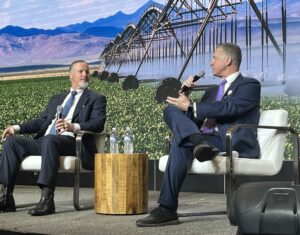Jan 11, 2024Top US ag negotiator urges Japan to trust potato science
The U.S.’s top agricultural negotiator has a message for markets where fresh potato exports are still meeting resistance: Trust the science.
Doug McKalip, chief agricultural negotiator in the Office of the United States Trade Representative, joined National Potato Council CEO Kam Quarles onstage Thursday at Potato Expo 2024 in Austin, Texas, to discuss ongoing efforts to open the Japanese market to fresh potatoes.
“Getting beyond chipping potatoes and getting to fresh potato access for Japan is a big priority for us,” McKalip said. “At the close of the year, we had dialogues with Japan that we will be continuing in earnest in 2024. I intend to go there specifically for this purpose. … It’s just going to take the same shoulder-to-the-grindstone approach that we took in Mexico, to stick with it, to keep building the relationships, to keep getting in front of the Japanese folks.”

The Mexican market opened to U.S. fresh potatoes in May 2023. The country is already the top destination for U.S. potato exports, accounting for $111 million in exports in 2022-23. The USDA’s Animal and Plant Health Inspection Service (APHIS) estimates full access will provide a market potential of $250 million per year in five years.
Quarles expects similar results if full access to the Japanese market is achieved. “Once opened, Japan will become another massive market for U.S. fresh potato exports, estimated at $150 million to $200 million annually (representing a 10% to 15% increase in global U.S. fresh potato exports),” Quarles wrote in a June column for Spudman.
Japan has been able to export chipping potatoes to Japan since 2006, Table stock access was first requested almost 30 years ago and elevated to a top priority during U.S.-Japan plant health negotiations in 2019.
The issue took center stage during September’s bilateral plant health meetings in Japan, though Quarles expressed disappointment before those discussions that a decades-long phytosanitary sticking point – a workable pest risk assessment – had yet to happen.
Quarles and McKalip both said Thursday that those potential risks have been addressed, with remaining resistance more political in nature.
“A lot of the technical work has been done, but clearly there’s a reluctance to move forward,” Quarles said.
McKalip said he is traveling to Japan in 2024 to again address full-market access.
“When regulators follow science, we win every time,” McKalip said. “Product safety, consistency, all of the measures that are put in place – stewardship, sustainability – if the regulators look at things from a science perspective, we are always, at the end of the day going to carry the day. We just have to stick with it and not give up.”
After Thursday’s exchange with Quarles, McKalip told Spudman “a few remaining questions” from Japanese regulators have been answered.
“We provided all the information the Japanese regulators requested of us,” he said. “So at this point, I think we’d like to see the science adhered to, for the scientists to show what their risk assessment outcome is, and to get moving ahead in the process.
“I’m optimistic that if the science is adhered to, the U.S. farmers will get the access that they need. That’s our goal, is to get to brass tacks on the science and get things wrapped up.”
– By Melinda Waldrop, managing editor







